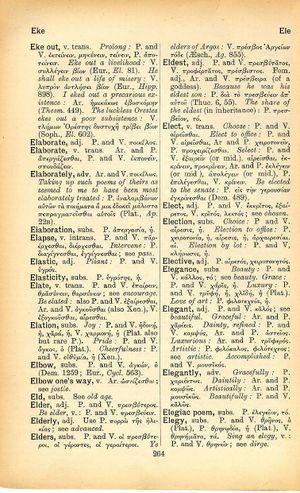elate
ὅτι μέντοι καὶ ἡ χρῆσις τῶν τρόπων, ὥσπερ τἆλλα πάντα καλὰ ἐν λόγοις, προαγωγὸν ἀεὶ πρὸς τὸ ἄμετρον, δῆλον ἤδη, κἂν ἐγὼ μὴ λέγω → however, it is also obvious, even without my saying so, that the use of figures of speech, like other literary adornments, is something that has always tempted toward excess
English > Greek (Woodhouse)
v. trans.
P. and V. ἐπαίρειν, θρασύνειν, θαρσύνειν; see encourage. Be elated: also P. and V. ἐξαίρεσθαι, Ar. and V. ὀγκοῦσθαι (also Xen.), V. ἐξογκοῦσθαι, αἴρεσθαι.
Latin > English (Lewis & Short)
ēlāte: adv.,
I loftily, proudly; v. 1. effero, P. a. fin.
ĕlăte: ēs, f., = ἐλάτη,
I a sort of firtree, Lat. abies, Plin. 12, 28, 62, § 134; 23, 5, 53, § 99.—
II The envelope or leaf of the palm-bud, Vulg. Cant. 5, 11.
Latin > French (Gaffiot 2016)
(1) ēlātē (elatus), avec élévation, noblesse ; sur un ton élevé, d’un style noble ; elate dicere Cic. Opt. 10, avoir de l’élévation dans le style || avec hauteur, orgueil : Nep. Paus. 2, 3 ; -tius Gell. 9, 15, 4.
(2) ĕlătē,¹⁴ ēs, f. (ἐλάτη), nom grec du sapin : Plin. 12, 134.
Latin > German (Georges)
(1) elatē1, ēs, f. (ελάτη), die Kokos- od. Dattelpalme, Plin. 12, 134; 23, 99 u.a.: germina palmae sibe (= sive) elatae, Palmtriebe, Edict. Diocl. 6, 40.
(2) ēlātē2, Adv. (elatus), I) erhaben, el. et ample loqui, Cic.: el. dicere (Ggstz. summisse d.), Cic. – II) stolz, übermütig, elatius se gerere, Nep.: elatius et arrogantius praefari, Gell.

